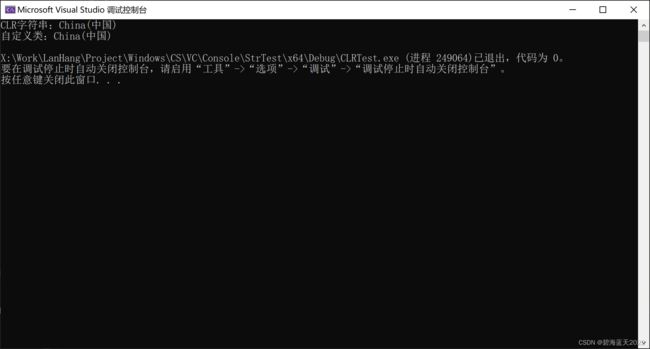使你的字符串类和 C# String一样兼容 ANSI 和 Unicode
有时候,假设你写了一个 string,默认是Unicode,
每次测试时都要: wstring s = L"字符串" ;
烦死人了。 例如:
_StringList _Syntax::Java_Keyword =
{
_t("abstract"), _t("assert"), _t("boolean"), _t("break"), _t("byte"), _t("case"), _t("catch"), _t("char"), _t("class"),
_t("const"),_t("continue"), _t("default"), _t("do"), _t("double"), _t("else"), _t("enum"), _t("extends"), _t("final"), _t("finally"),
_t("float"), _t("for"), _t("goto"), _t("if"), _t("implements"), _t("import"), _t("instanceof"), _t("int"), _t("interface"),
_t("long"), _t("native"), _t("new"), _t("package"), _t("private"), _t("protected"), _t("public"), _t("return"), _t("strictfp"),
_t("short"), _t("static"), _t("super"), _t("switch"), _t("synchronized"), _t("this"), _t("throw"), _t("throws"), _t("transient"),
_t("try"), _t("void"), _t("volatile"), _t("while") ,_t("operator")
};
_StringList _Syntax::Java_Basicclass =
{
_t("Integer"), _t("Double"), _t("_Number"), _t("MathCharacter"), _t("BooleanString"), _t("BufferString"),
_t("BuilderArrays"), _t("Scanner"), _t("Math"), _t("String"), _t("Arrays")
};
_StringList _Syntax::Python_Keyword =
{
//blue
_t("True"),
_t("False"),
_t("await"),
_t("else"),
_t("import"),
_t("pass"),
_t("None"),
_t("break"),
_t("except"),
_t("in"),
_t("raise"),
_t("and"),
_t("or"),
_t("finally"),
_t("is"),
_t("return"),
_t("as"),
_t("for"),
_t("lambda"),
_t("try"),
//red
_t("assert"),
_t("def"),
_t("from"),
_t("nonlocal"),
_t("while"),
_t("async"),
_t("del"),
_t("global"),
_t("not"),
_t("with"),
//yellow
_t("class"),
_t("if"),
_t("yield"),
//green
_t("continue"),
_t("exec"),
_t("print"),
_t("imp"),
_t("pkgutil"),
_t("ctypes") /* 更多关键字可以自行添加 */
};
你可以用一个自动转换函数,模似CLR的 System::String^;
例子:
using namespace System;
using namespace lf;
int main(array ^args)
{
System::String^ clrs = gcnew String("China"); //Ansi字行串
clrs += L"(中国)"; //Unicode 字行串
Console::Write("CLR字符串:");
Console::WriteLine(clrs);
_string s("China"); //Ansi字行串,_string 是 _StrW
s += L"(中国)"; //Unicode 字行串
_cout << _t("自定义类:") << s <<_t("\n");
return 0;
}
输出:
在_StrW类中定义:
#ifdef _STR_COMPATIBILITY_
///
/// 允许 _StrW str("abc"); 而不是每次都要写 _StrW str(_t("abc"))
///
/// 数据指针
/// 缓冲大小
/// 是否把缓冲初始化为零
/// 创建时间: 2023-05-08 最后一次修改时间:2023-05-08
_StrW(const char* pStr, const int& nBuffer = 0, bool bZeroBuffer = false);
operator _StrA() const;
#endif
#ifdef _STR_COMPATIBILITY_ //兼容 _StrA 与 _StrW 互相兼容
///
/// 允许 _StrW str("abc"); 而不是每次都要写 _StrW str(_t("abc"))
///
/// 数据指针
/// 缓冲大小
/// 是否把缓冲初始化为零
/// 创建时间: 2023-05-08 最后一次修改时间:2023-05-08
_StrW::_StrW(const char* pStr, const int& nBuffer, bool bZeroBuffer) :
_Str(gs.StringToWString(pStr).Pointer, nBuffer, bZeroBuffer)
{
}
_StrW::operator _StrA() const
{
return gs.WStringToString(_pData,_nLength).Pointer;
}
#endif 在_StrA类中定义:
#ifdef _STR_COMPATIBILITY_
///
/// 允许 _StrW str("abc"); 而不是每次都要写 _StrW str(_t("abc"))
///
/// 数据指针
/// 缓冲大小
/// 是否把缓冲初始化为零
/// 创建时间: 2023-05-08 最后一次修改时间:2023-05-08
_StrA(const wchar_t* pStr, const int& nBuffer = 0, bool bZeroBuffer = false);
operator _StrW() const;
#endif
#ifdef _STR_COMPATIBILITY_
_StrA::_StrA(const wchar_t* pStr, const int& nBuffer, bool bZeroBuffer)
: _Str(gs.WStringToString(pStr).Pointer, nBuffer, bZeroBuffer)
{
}
_StrA::operator _StrW() const
{
return gs.StringToWString(_pData, _nLength).Pointer;
}
#endif 转换函数:
///
/// 把 char* 转为 wchar_t*
/// 返回的Mem.Pointer是指向字符串的指针
/// 返回的Mem.DataLength是字符串的长度
///
///
/// 转换字符串的长度,如果没有给出,则自动计算字符串长度。
/// global_c_str::StringToWString(const char* pstr, const int nStrLength)
{
int nConverLen = nStrLength > 0 ? nStrLength : _Math::StrLen_t(pstr);
_Mem m(nConverLen + 1); //最起码长度加1
::mbstowcs_s(& m.DataLength, m.Pointer, m.AllLength, pstr, m.AllLength);
//m.ZeroEnd(); //wcstombs_s会把最后一位字节设为0
return m;
}
///
/// 把 wchar_t* 转为 char*
/// 返回的Mem.Pointer是指向字符串的指针
/// 返回的Mem.DataLength是字符串的长度
///
///
/// 转换字符串的长度,如果没有给出,则自动计算字符串长度。
/// global_c_str::WStringToString(const wchar_t* pstr, const int nStrLength)
{
/*
pReturnValue: The number of characters converted. ----- 转换后的多字节字符串的字符数;
mbstr: The address of a buffer for the resulting converted multibyte character string. ----- char类型的字符或字符串的地址 (接收转换后的字符串的缓冲区);
sizeInBytes: The size in bytes of the mbstr buffer. ----- 用来接收转换后字符char类型缓冲区的大小(以字节记);
wcstr: Points to the wide character string to be converted. ----- wchar_t类型的字符串的地址(需要转换的字符串的缓冲区的地址);
count: The maximum number of bytes to be stored in the mbstr buffer ----- 最多可以存入mbstr的字节数。
// Conversion
wcstombs_s(&i, pMBBuffer, (size_t)BUFFER_SIZE, pWCBuffer, (size_t)BUFFER_SIZE );
*/
int nConverLen = nStrLength > 0 ? nStrLength : _Math::StrLen_t(pstr);
_Mem m(nConverLen * 2 + 1);
::wcstombs_s(&m.DataLength, m.Pointer, m.AllLength, pstr, m.AllLength);
//m.ZeroEnd(); //wcstombs_s会把最后一位字节设为0
return m;
} 